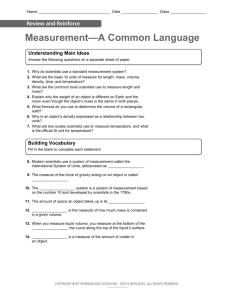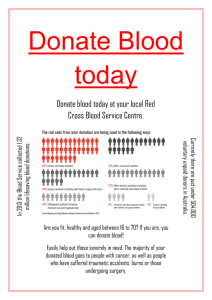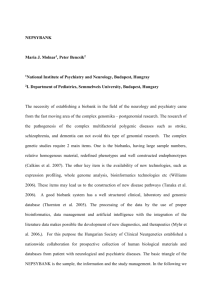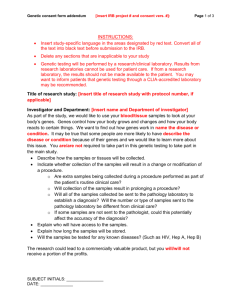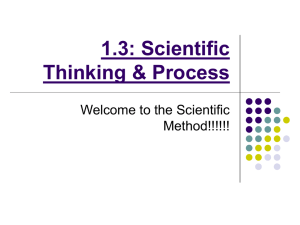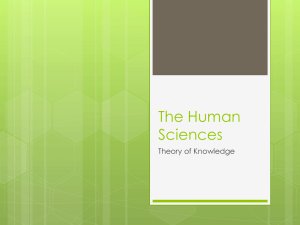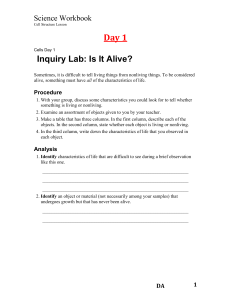Medical Research Consent Form: Donate Samples & Data
advertisement
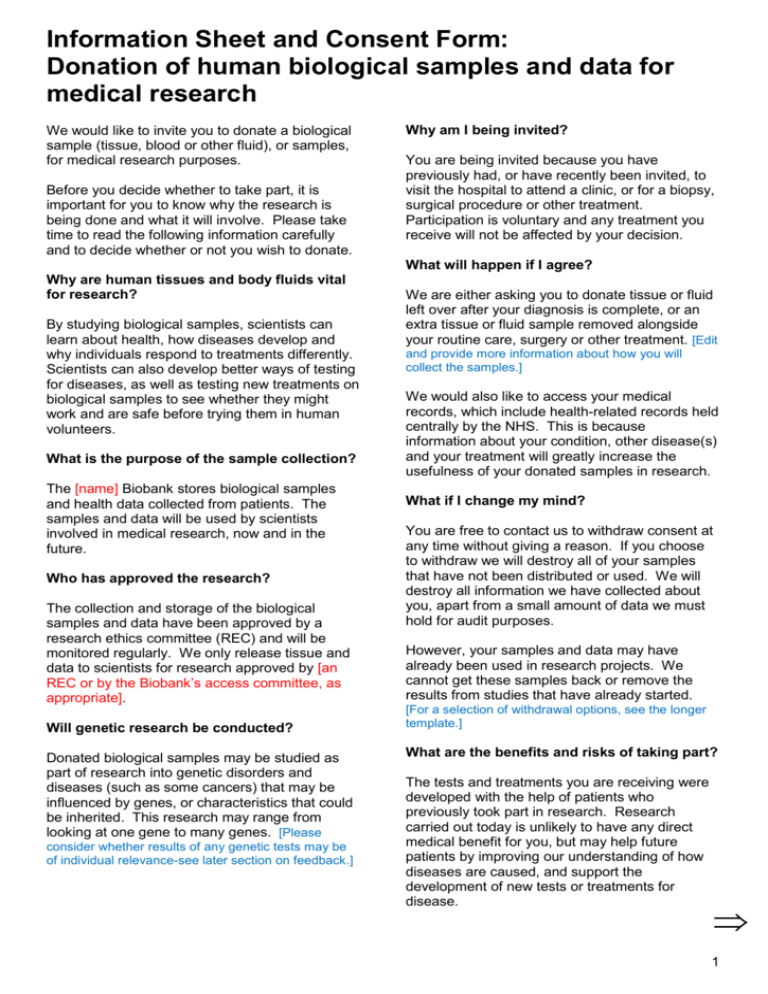
Information Sheet and Consent Form: Donation of human biological samples and data for medical research We would like to invite you to donate a biological sample (tissue, blood or other fluid), or samples, for medical research purposes. Before you decide whether to take part, it is important for you to know why the research is being done and what it will involve. Please take time to read the following information carefully and to decide whether or not you wish to donate. Why am I being invited? You are being invited because you have previously had, or have recently been invited, to visit the hospital to attend a clinic, or for a biopsy, surgical procedure or other treatment. Participation is voluntary and any treatment you receive will not be affected by your decision. What will happen if I agree? Why are human tissues and body fluids vital for research? By studying biological samples, scientists can learn about health, how diseases develop and why individuals respond to treatments differently. Scientists can also develop better ways of testing for diseases, as well as testing new treatments on biological samples to see whether they might work and are safe before trying them in human volunteers. What is the purpose of the sample collection? The [name] Biobank stores biological samples and health data collected from patients. The samples and data will be used by scientists involved in medical research, now and in the future. Who has approved the research? The collection and storage of the biological samples and data have been approved by a research ethics committee (REC) and will be monitored regularly. We only release tissue and data to scientists for research approved by [an REC or by the Biobank’s access committee, as appropriate]. Will genetic research be conducted? Donated biological samples may be studied as part of research into genetic disorders and diseases (such as some cancers) that may be influenced by genes, or characteristics that could be inherited. This research may range from looking at one gene to many genes. [Please consider whether results of any genetic tests may be of individual relevance-see later section on feedback.] We are either asking you to donate tissue or fluid left over after your diagnosis is complete, or an extra tissue or fluid sample removed alongside your routine care, surgery or other treatment. [Edit and provide more information about how you will collect the samples.] We would also like to access your medical records, which include health-related records held centrally by the NHS. This is because information about your condition, other disease(s) and your treatment will greatly increase the usefulness of your donated samples in research. What if I change my mind? You are free to contact us to withdraw consent at any time without giving a reason. If you choose to withdraw we will destroy all of your samples that have not been distributed or used. We will destroy all information we have collected about you, apart from a small amount of data we must hold for audit purposes. However, your samples and data may have already been used in research projects. We cannot get these samples back or remove the results from studies that have already started. [For a selection of withdrawal options, see the longer template.] What are the benefits and risks of taking part? The tests and treatments you are receiving were developed with the help of patients who previously took part in research. Research carried out today is unlikely to have any direct medical benefit for you, but may help future patients by improving our understanding of how diseases are caused, and support the development of new tests or treatments for disease. 1 There are minor risks to you as a result of your participation. If we take an extra tissue or fluid sample this may cause some bleeding, bruising, dizziness and/or discomfort. A failure in sample and data security is extremely unlikely, but in the event this happened there is a risk that you would be re-identified, which may cause related medical or genetic information to be revealed. organisation may then make a profit out of the product they have developed. However, you will not receive any financial reward for donating your samples or data, or from the results of the research, either now or in the future. Who will access my samples and data? How will my samples and data be stored and kept confidential? To keep your information and samples confidential, we have put numerous safeguards in place. In particular, we will replace personal identifiers such as your name and full address with a code before we distribute your samples or data. Scientists sign a contract with us that covers how samples and data may be stored and used. This contract applies even when samples and data are transferred abroad. We will also use stringent security measures to prevent unauthorised access to your samples or data. We will not allow third parties such as employers, insurance companies or family members to access your samples or data unless required by law or court order. You will not be identified in any publications. Will anyone make money from my samples or data? We may charge researchers a fee for access to your samples and data to cover the costs of collection, storage and transportation. If scientists develop a new test, treatment or drug using your biological samples and data, a commercial company or other research Scientists who use your biological samples may work in universities, hospitals, charities or commercial companies. They may also work abroad. After removing personal identifiers, your health information and related research results may also be shared with other biobanks, research groups or placed in scientific databases. How long will my samples and data be stored? Your sample(s) and associated data may be used immediately or stored, potentially for many years, until released to researchers for use in approved research. Will I find out the results of the research? [Provide more information about whether and how results will be returned, in particular see the MRC & Wellcome Trust document on feedback of healthrelated findings arising from research. If you are able to provide general information about the research, for example, through a website, this should also be mentioned here.] Further information [Provide contact details] Consent Section Donor I agree that the biobank may re-contact me in the future to ask me to provide additional samples or information or to invite me to take part in further research. I understand that this does not oblige me to provide any more samples or take part in further research. Y/N I have read the information sheet and had the opportunity to ask questions. I agree to donate samples and allow access to my medical record for use in the medical research, as described above. Signed……………………….……….Print Name……………………………………Date…………………. Professional seeking consent I have explained the information above to the donor and have answered all of their questions. Signed…………………………….….Print Name……………………………………Date…………………. 2 STRATUM two-page information/generic consent template for biobanks. Please refer to longer template for more in-depth text on different recruitment pathways and further optional content that relates to research involving cell lines, animals or post-mortem samples http://stratumbiobanking.org/




